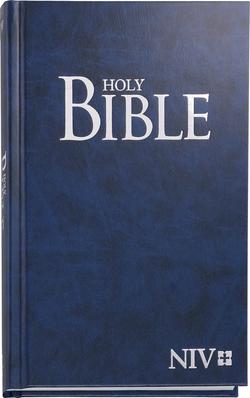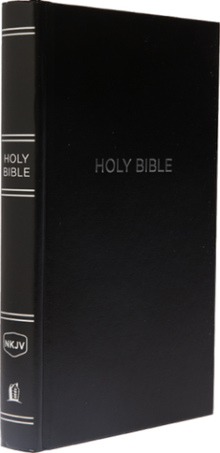
The King James Version (KJV), also the King James Bible (KJB) and the Authorized Version, is an Early Modern English translation of the Christian Bible for the Church of England, which was commissioned in 1604 and published in 1611, by sponsorship of King James VI and I. The 80 books of the King James Version include 39 books of the Old Testament, 14 books of Apocrypha, and the 27 books of the New Testament. Noted for its "majesty of style", the King James Version has been described as one of the most important books in English culture and a driving force in the shaping of the English-speaking world.

The New International Version (NIV) is a translation of the Bible in contemporary English. Published by Biblica, the complete NIV was released in 1978 with a minor revision in 1984 and a major revision in 2011. The NIV relies on recently published critical editions of the original Hebrew, Aramaic, and Greek texts.
Jah or Yah is a short form of יהוה (YHWH), the four letters that form the tetragrammaton, the personal name of God: Yahweh, which the ancient Israelites used. The conventional Christian English pronunciation of Jah is, even though the letter J here transliterates the palatal approximant. The spelling Yah is designed to make the pronunciation explicit in an English-language context, especially for Christians who may not use Hebrew regularly during prayer and study.

The Matthew Bible, also known as Matthew's Version, was first published in 1537 by John Rogers, under the pseudonym "Thomas Matthew". It combined the New Testament of William Tyndale, and as much of the Old Testament as he had been able to translate before being captured and put to death. Myles Coverdale translated chiefly from German and Latin sources and completed the Old Testament and Biblical apocrypha, except for the Prayer of Manasseh, which was Rogers', into the Coverdale Bible. It is thus a vital link in the main sequence of English Bible translations.
Partial Bible translations into languages of the English people can be traced back to the late 7th century, including translations into Old and Middle English. More than 100 complete translations into English have been written.

The God's Word Translation (GW) is an English translation of the Bible. God's Word to the Nations Mission Society managed and funded the translation.

The Holman Christian Standard Bible (HCSB) is a modern English Bible translation from Holman Bible Publishers. The New Testament was published in 1999, followed by the full Bible in March 2004.

The New King James Version (NKJV) is a translation of the Bible in contemporary English. Published by Thomas Nelson, the complete NKJV was released in 1982. With regard to its textual basis, the NKJV relies on a recently published critical edition for the Old Testament, while opting to use the Textus Receptus for the New Testament.

Modern English Bible translations consists of English Bible translations developed and published throughout the late modern period to the present.
The Darby Bible refers to the Bible as translated from Hebrew and Greek by John Nelson Darby.

Luke 2 is the second chapter of the Gospel of Luke in the New Testament, traditionally attributed to Luke the Evangelist, a companion of Paul the Apostle on his missionary journeys. It contains an account of Jesus's birth and an incident from his childhood. Verses 1–14 are often read during services of worship on Christmas Day.
John Bertram Phillips or J. B. Phillips was an English Bible translator, author and Anglican clergyman. He is most noted for his The New Testament in Modern English.

John 10 is the tenth chapter of the Gospel of John in the New Testament of the Christian Bible. The author of the book containing this chapter is anonymous, but early Christian tradition uniformly affirmed that John composed this Gospel. This chapter records Jesus' description of himself as the "door of the sheep" and the "Good Shepherd", and contains the only mention of Hanukkah, "the Feast of Dedication", in the New Testament.
Messianic Bible translations are translations, or editions of translations, in English of the Christian Bible, some of which are widely used in the Messianic Judaism and Hebrew Roots communities.

Four Prophets: Amos, Hosea, First Isaiah and Micah: A Modern Translation from the Hebrew by J. B. Phillips is a modern translation from Hebrew sources of the books of Amos, Hosea, First Isaiah and Micah by scholar J. B. Phillips. The book was published in 1963 Macmillan in the US and Geoffrey Bles in the UK. Phillips also published The New Testament in Modern English. The remainder of the Old Testament was never completed by him.
The Voice is a modern language, dynamic equivalent English translation of the Bible developed by Thomas Nelson and the Ecclesia Bible Society. The original New Testament was released in January 2011, the revised and updated New Testament was released in November 2011, and the full Bible was released in April 2012.
Kyrios or kurios is a Greek word which is usually translated as "lord" or "master". It is used in the Septuagint translation of the Hebrew scriptures about 7000 times, in particular translating the name God YHVH, and it appears in the Koine Greek New Testament about 740 times, usually referring to Jesus.

The Modern English Version (MEV) is an English translation of the Bible begun in 2005 and completed in 2014. The work was edited by James F. Linzey, and is an update of the King James Version (KJV), re-translated from the Masoretic Text and the Textus Receptus.

2 Corinthians 2 is the second chapter of the Second Epistle to the Corinthians in the New Testament of the Christian Bible. It is authored by Paul the Apostle and Timothy in Macedonia in 55–56 CE.











